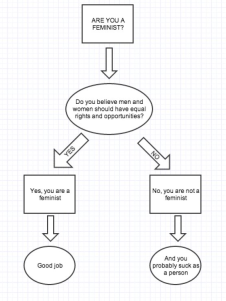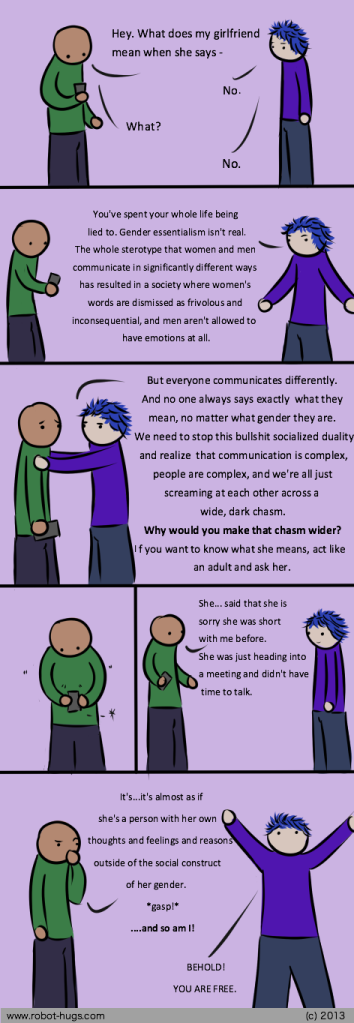Misandry (definition: hatred of men) is not a thing.
This is a controversial statement to make.
However, when feminists use this catchy slogan, we are completely aware of the fact that there are, indeed, situations in which men are disadvantaged by their gender. We are not disputing this fact, we are simply pointing out that, given the current reality that men hold the “one-up position” in society, true misandry does not occur and cannot occur on a large enough scale for it to merit the same amount of attention and activism that misogyny does. In other words, the current societal climate necessitates that issues of misandry are not our primary concern.
Hence, the feminist slogan, “Misandry is not a thing”.
Feminists are consciously refusing to spend an equal amount of time and effort addressing misandry, because an equal amount of time and effort should not be allocated to solve the subsidiary issues of the privileged group.
Even so, often in the midst of conversation regarding feminism someone points out how men are left out of the discussion. This person (if not arguing from the standpoint that feminism is secretly advocating men’s oppression) argues that if feminists wish to get men on their side, they ought to include talk about both men and women’s issues. Focusing solely on women supposedly alienates the people feminists need to ally with in order to enact social change.
This is why there is such opposition to the term “Feminism” as used to describe the movement towards gender equality. If it is a movement based on eliminating pernicious social norms and structures which disadvantage both men and women, why not call it “Equalism” or something of the like?
The answer is that feminism is named thusly to put the focus on the disadvantaged group: women. The pernicious social norms and structures are damaging to women far more often than they are to men. This is true to such an extent that in our society, the supposedly neutral human – the default – is a man. So when we choose to use the term “Feminism,” or the slogan “misandry is not a thing,” we do so intentionally to direct the focus to the group who is most often ignored, underrepresented, and harmed.
Yes, men, we need you on the side of feminism for this whole thing to work. But we do not need to mitigate our efforts to solve women’s issues by addressing misandry as much as we address misogyny. To do so would be to enforce male privilege, not lessen it. The process of achieving equality of the sexes requires men to give up their privileges, one of which is their expectation to be included in and catered to by every institution and discussion.
Feminists are not in any way advocating the systematic oppression of men by using the slogan “Misandry is not a thing.” We are not telling men that it is impossible that their gender could somehow disadvantage them, either. We are simply asserting the point that misandry, here and now, in this discussion, is not relevant. Misogyny is.
The unfortunate day could hypothetically arrive when men are the underprivileged group and misandry does merit our attention, but that day is nowhere in the near future. Those who cry “Misandry!” when they hear “Feminism!” need to stop yelling fire before someone has even lit a candle.
For further reading:
If I Admit That ‘Hating Men’ Is a Thing, Will You Stop Turning It Into a Self-Fulfilling Prophecy?
Sorry, Men, You’re STILL Not Oppressed: Reexamining the Fallacies of “Misandry”
This post was written in partial response to:
On the Misandry Isn’t a Thing Thing





